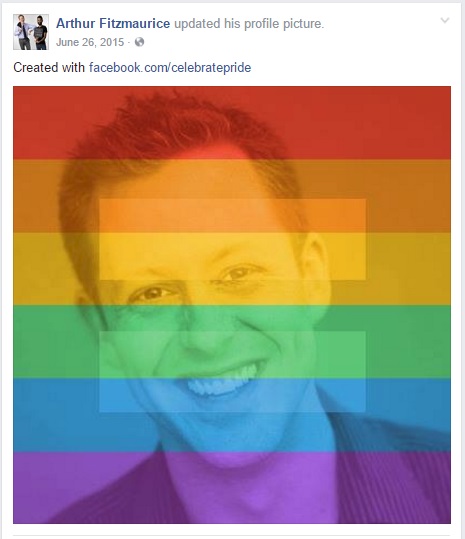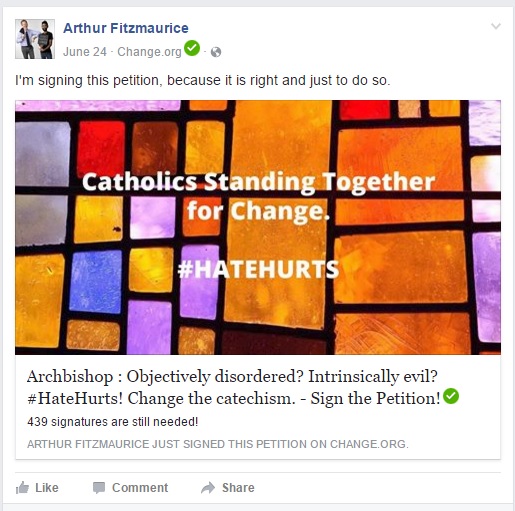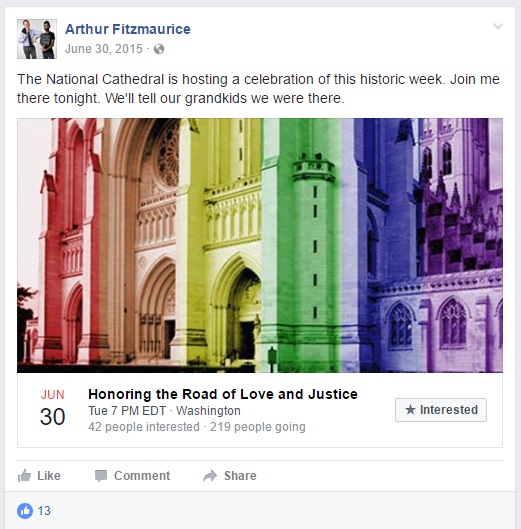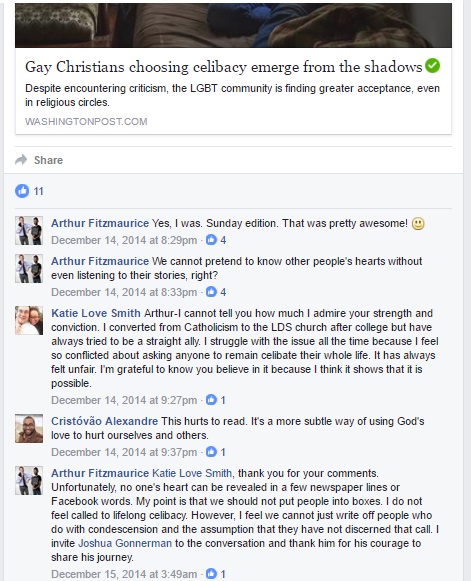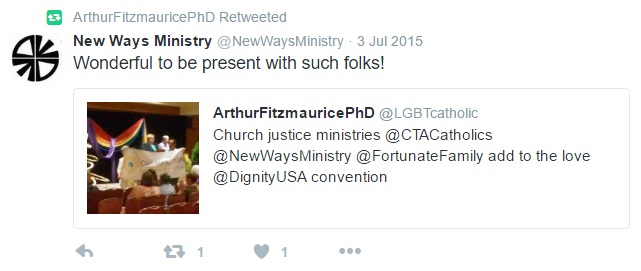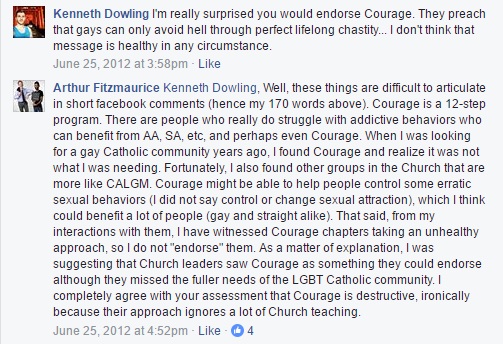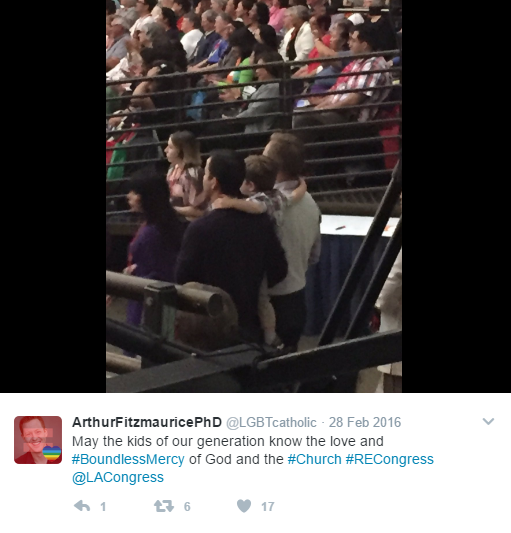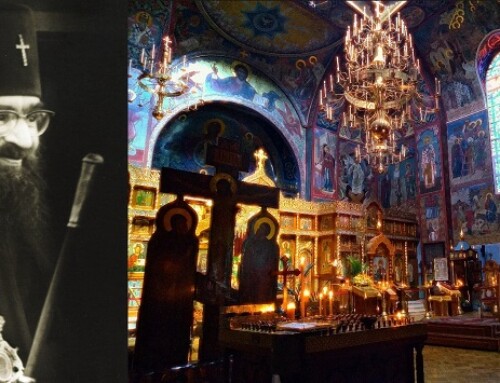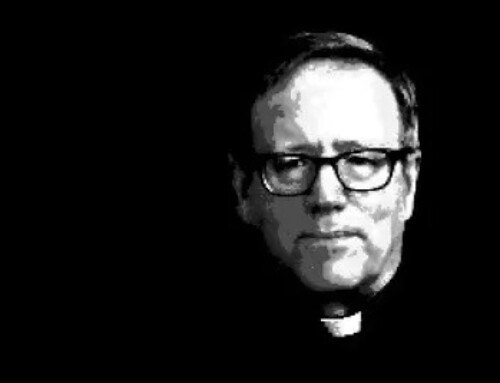At the upcoming 2017 Los Angeles Religious Education Congress, one of the speakers will be Arthur Fitzmaurice, the former Chair of the Los Angeles Archdiocese Catholic Ministry with Lesbian and Persons (CMLGP). At the 2015 Congress, Fitzmaurice openly criticized “The Catechism of the Catholic Church:”
“The paragraph [in the Catechism] on homosexuality — which describes it as ‘intrinsically disordered’ while also demanding respect for gays and lesbians — is placed in a section of the catechism paragraphs condemning ‘pornography, prostitution, and rape…To keep this abusive language in the Catechism and other Church writings is, in itself, gravely evil.”
Fitzmaurice, currently (since 2010) serves as resource director of the dissident Catholic Association for Lesbian and Gay Ministry (CALGM). In the past, Fitzmaurice, besides commenting on The Catechism, stated that he promotes: “the pastoral side that says ‘God made you this way;’” He also said: “Being gay has been a gift from God…Neither they [the Church hierarchy] nor I can put down what God has given me.” Lastly, Fitzmaurice says that his group (CALGM) only wants “to create a Church where all are welcome at all parishes.”
On June 24, 2016, Fitzmaurice signed an on-line petition created by the pro-gay and pro-female ordination group Call To Action which asks for changes in The Catechism regarding teachings on homosexuality; Frank McKown, the current co-Chair of CMLGP did the same thing the following day. Earlier, on April 8, 2016, Fitzmaurice entered into a Facebook discussion with three other men, one being McKown, concerning possible changes in the Church with regards to homosexuality. The conversation was initiated by apparent disappointment over Pope Francis’ Apostolic Exhortation “The Joy of Love,” Fitzmaurice wrote:
We should not expect Vatican III in one document. I think it’s more that the can was kicked into a trolley and carried up the road a little bit. To use another analogy, windows were opened with Evangelii Gaudium. Now a door has opened.
The most interesting observation to the post of Fitzmaurice was offered by Fr. James Graham, a Melkite Catholic priest, he wrote:
…thanks for this perspective. Pope Francis is subtle and strategic. He has opened the door for new interpretations and implementations with words that may seem ambiguous or even negative, but whose ambiguity contains possibility.
McKown responded:
Sadly, I’m afraid not much movement will happen beyond Amoris Laetitia when terms such as ‘gravely depraved’ and ‘objectively disordered’ still haunt the catechism.
Fitzmaurice wrote:
The language certainly still needs to change. It is gravely evil language.
Then, to another man who expressed some skepticism about so-called changes in the Church on this issue, Fitzmaurice answered:
If you want to go to a different church, go for it. But if you want to stay, maybe you can be louder. Maybe you can say the things that you want Pope Francis to say. Why wait for him to say it? Speak the Truth.
A pronounced difficulty with the term “intrinsically disordered” has been characteristic of all gay-affirmative ministries within the Catholic Church since it first appeared in the 1986 “Letter to the Catholic Bishops on the Pastoral Care of Homosexual Persons” and then when it later reappeared in The Catechism. One of the early opponents to this teaching was the Jesuit John J McNeill who wrote:
Since most gay people experience their homosexual orientation as a part of creation, if they accept this Church teaching, they must see God as sadistically creating them with an intrinsic orientation to evil. Most gays would prefer to see the Church teaching as wrong, rather than believe God is sadistic.
Recently, another Jesuit expressed much the same ideology as Fitzmaurice and McNeill; James Martin wrote:
Some bishops have already called for us to set aside the phrase “objectively disordered” when it comes to describing the homosexual inclination (as it is in the Catechism, No. 2358). The phrase relates to the orientation, not the person, but it is still needlessly hurtful. Saying that one of the deepest parts of a person—the part that gives and receives love—is “disordered” in itself is needlessly cruel.
The reason behind the constant obsession with the word “disordered” is that gay-affirmative ministries subscribe completely to the “born gay” or “God made me gay” theory. In a 2013 video interview for The IN [Ignatian News] Network, made in cooperation with St. Monica’s Catholic Gay and Lesbian Outreach in Santa Monica, Arthur Fitzmaurice said: “I tried to be directed towards God…How do I be the person that God made me to be; and then it gets converted into a realization that God made me to be this gay person.”
Part and parcel with this implicit rejection of The Catechism is a gradualist theory of change in the Catholic Church which will eventually result in a massive revision of doctrine regarding homosexuality. This theory is often expressed by the dissident Sister Jeannine Gramick, co-founder of New Ways Ministry. In 2011, Gramick stated: “But because I know church history, I know change takes centuries. We are planting seeds for change at the upper level of leadership.” She continued: “When we started this work, only 20 percent of Catholics believed in equal rights for gays and lesbians. Now it’s over 73 percent…The church is moving.” This is eerily similar to a statement posted by CMLGP after a same-sex couple and their son presented the gifts to Archbishop Gomez at the 2016 LA Congress “Margins” Mass:
Progress for LGBT Catholics is slow and happens in incremental pieces, and often includes setbacks. I saw much progress this past weekend at the Religious Education Congress in Anaheim. Our ministry was honored to participate in the Church on the Margins liturgy…Four sold out LGBT-affirming sessions were presented including first time session in Spanish and one with a transgender topic. But if there was one indelible moment, it may have come at the closing liturgy on Sunday when a gay couple and their son helped present gifts at the altar to Archbishop Jose Gomez.
After a lengthy investigation by the Vatican into the highly questionable pastoral work of Sister Gramick and the other co-founder of New Ways Ministry, Fr. Robert Nugent, he and Gramick were both “permanently prohibited from any pastoral work involving homosexual persons.” The Vatican “Notification” from 1999, implicitly stated that:
Sister Gramick, while expressing her love for the Church, simply refused to express any assent whatsoever to the teaching of the Church on homosexuality…In particular, he [Fr. Nugent] would not state that homosexual acts are intrinsically disordered…
In 2012, board members of CALGM, including Fitzmaurice, refused to sign an “oath of personal integrity” to Catholic teaching.
Fitzmaurice implies the same sort of gradualist approach, only speeded-up due to the persistence of certain LGBT Catholics, in his Facebook response, when he stated: “…be louder. Maybe you can say the things that you want Pope Francis to say. Why wait for him to say it?” But he went even further when Fitzmaurice castigated the Catholic Bishops of the US for their opposition to the Supreme Court ruling legalizing same-sex marriage; printed in “The National Catholic Reporter,” Fitzmaurice demanded the voices of LGBT Catholics be heard – if they refuse, the Bishops, according to Fitzmaurice, “cannot hear the voice of God:”
If the Church hierarchy wants to understand the Spirit alive in the world, it needs to listen to our stories of finding new life—and deeper relationship with God—even in the midst of confusion and suffering. Until they listen, they cannot hear the voice of God speaking through us.
At an interview during the 2015 LA Congress, Fitzmaurice repeated this same sentiment:
…the spirit is alive in the hearts of LGBT people and it’s the slow movement of the spirit within us that’s creating community, that’s teaching us – the message of love is what’s at the core, it’s not about a few words in The Catechism.
In a response to a post concerning chaste Catholic author Eve Tushnet, Fitzmaurice wrote:
I do not feel called to lifelong celibacy.
Related link:
